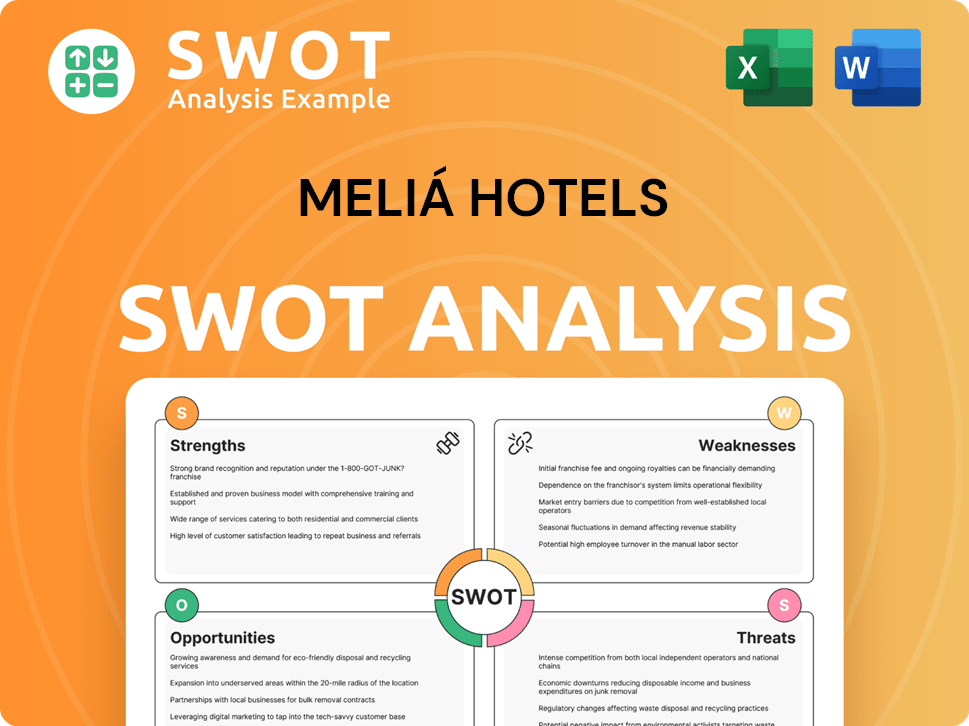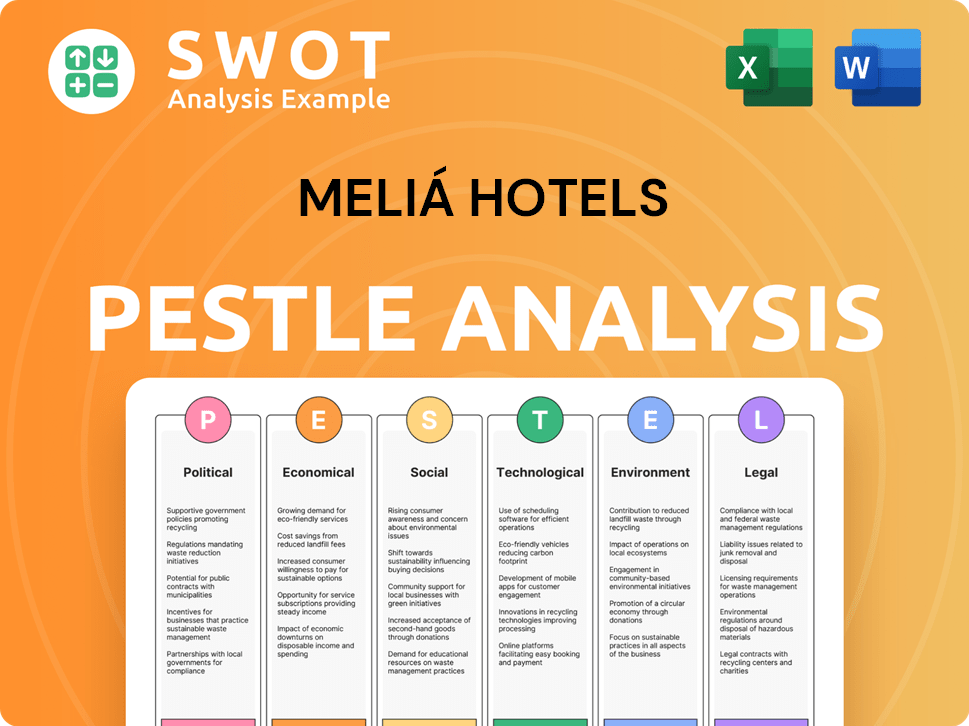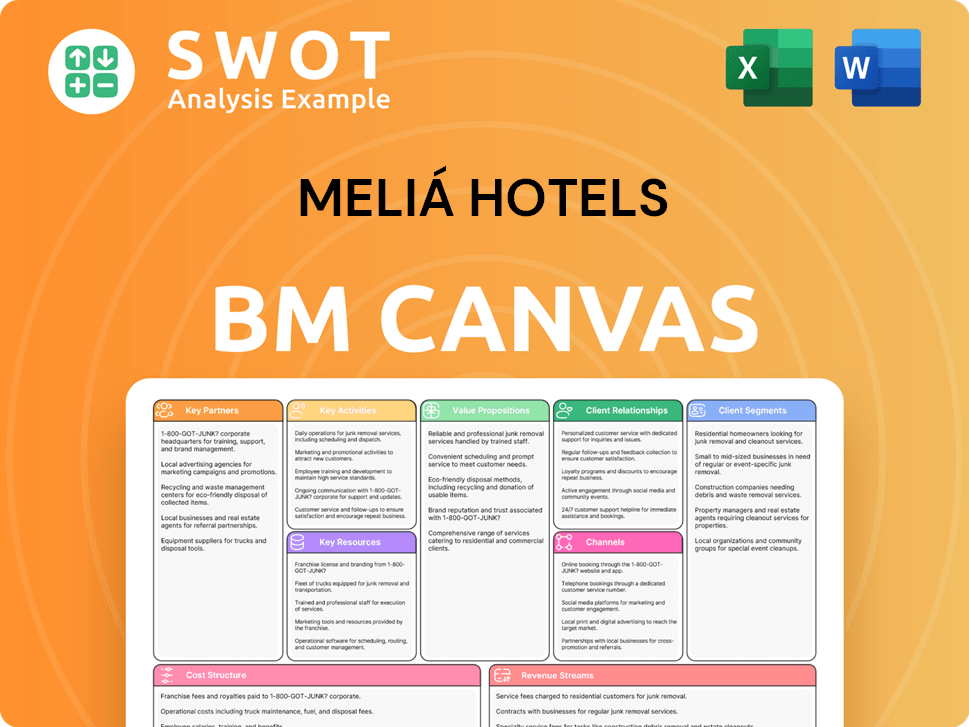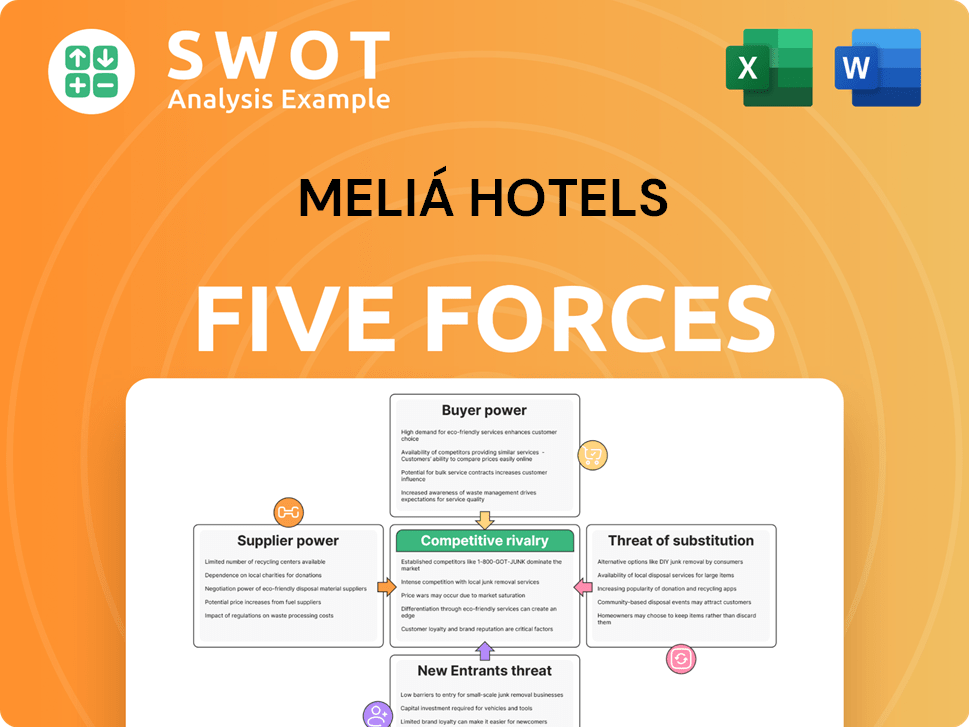Meliá Hotels Bundle
How has Meliá Hotels Company Redefined Hospitality Sales and Marketing?
From its humble beginnings in Spain, Meliá Hotels International has transformed into a global powerhouse, strategically navigating the ever-changing hospitality industry. Its bold move into premium and luxury segments has fueled an impressive financial recovery, exceeding pre-pandemic revenue levels, with a remarkable RevPAR increase in 2024. This success story reveals a dynamic Meliá Hotels SWOT Analysis, showcasing the power of strategic sales and marketing.

This deep dive into Meliá's strategy will uncover the secrets behind its impressive growth, exploring its diverse sales channels, innovative marketing tactics, and distinct brand positioning. Learn how Meliá's focus on direct distribution and proprietary channels, like Melia.com, has driven over €1 billion in sales. We'll analyze the key campaigns and the overall Meliá Hotels Company sales strategy that have solidified its position as a leader in the competitive hotel market, including its Meliá Hotels Company marketing strategy and overall Meliá Hotels Company strategy.
How Does Meliá Hotels Reach Its Customers?
The Meliá Hotels Company sales strategy centers around a multifaceted approach, utilizing both online and offline channels to engage its diverse customer base. This strategy has evolved, with a notable emphasis on direct distribution channels in recent years. The company's commitment to digital adoption and omnichannel integration is evident in its sales channel development.
A core component of their Meliá Hotels Company marketing strategy involves proprietary digital channels, including Melia.com and the Meliá App. These platforms are pivotal in driving direct-to-consumer (DTC) engagement, providing greater control over the customer experience. This strategic shift has allowed Meliá Hotels Company strategy to potentially improve profit margins.
In 2024, Melia.com and the Meliá App collectively generated over €1 billion in sales, accounting for 50% of centralized sales. This highlights the success of the company's direct distribution efforts. The company continues to maintain strong relationships with wholesale distributors and partners, including traditional tour operators, to broaden its market reach.
Melia.com and the Meliá App are key direct booking platforms. These platforms are essential for driving direct-to-consumer engagement. They provide greater control over the customer experience and potentially higher profit margins.
MeliaPro is the B2B digital platform for professionals. Sales through MeliaPro increased by 21% in 2024. This platform supports travel agencies and corporate clients, contributing to overall sales.
Meliá maintains relationships with wholesale distributors and partner retailers. These partnerships include traditional tour operators. This ensures a broad market reach for the company.
The company operates on management, franchise, and ownership bases. This diversification further expands its reach and operational models. These models contribute to the overall sales strategy.
The evolution of these channels reflects a strategic pivot towards digital adoption and omnichannel integration. While traditional channels remain important, the accelerated growth of Melia.com and the Meliá App showcases a successful strategic shift.
- The company's collaboration with Rafael Nadal for the ZEL lifestyle brand.
- This contributes to unique distribution avenues.
- This also helps in market share gains.
- The multi-pronged approach ensures a broad market reach while prioritizing direct customer relationships.
Meliá Hotels SWOT Analysis
- Complete SWOT Breakdown
- Fully Customizable
- Editable in Excel & Word
- Professional Formatting
- Investor-Ready Format

What Marketing Tactics Does Meliá Hotels Use?
The marketing tactics employed by Meliá Hotels International are multifaceted, designed to boost brand awareness, draw in potential customers, and ultimately boost sales. Their approach is heavily influenced by data and digital innovation, ensuring they stay competitive in the dynamic hospitality market. This strategy is crucial for implementing their Growth Strategy of Meliá Hotels.
Digital marketing forms a core part of their strategy, utilizing various channels to engage with customers and drive direct sales. They also incorporate traditional methods and partnerships to broaden their reach and strengthen their brand image. Sustainability is a key focus, with ESG principles integrated into their business and marketing strategies, appealing to environmentally and socially conscious travelers.
Meliá's marketing efforts are also focused on customer retention and loyalty, with the MeliáRewards program playing a significant role. This program, celebrating its 30th anniversary in 2024, has over 15 million members, demonstrating its effectiveness in keeping guests returning and incentivizing repeat stays through exclusive benefits and promotions.
Meliá Hotels Company's digital marketing strategy is comprehensive, including content marketing, SEO, paid advertising, and email campaigns. They maintain a strong presence on social media platforms to engage with potential customers. The revamped Meliá App and Melia.com are central to their digital strategy, serving as key platforms for direct sales and customer engagement.
Customer segmentation and personalization are key aspects of Meliá's data-driven marketing approach. They analyze guest preferences to tailor offerings, enhancing the customer experience and boosting loyalty. The MeliáRewards program is a critical tool for retaining customers and incentivizing repeat stays.
The MeliáRewards loyalty program, with over 15 million members, is a cornerstone of their customer retention strategy. The program provides tiered benefits and exclusive promotions to encourage repeat business. This strategy is crucial for building long-term customer relationships and driving sales.
Meliá Hotels Company continues to participate in international tourism trade fairs like FITUR 2025 to showcase its expansion plans and engage with industry professionals. They also utilize traditional media and events to build brand awareness.
Strategic partnerships, such as the collaboration with Rafael Nadal for the ZEL brand, boost brand visibility and credibility. These partnerships help to reach new audiences and enhance brand image.
Meliá integrates ESG principles into its business strategy, using sustainable tourism as a key marketing differentiator. This approach appeals to environmentally conscious travelers and enhances the company's brand image.
Meliá Hotels Company's marketing strategy is a blend of digital and traditional methods, with a strong emphasis on data and customer engagement. This approach supports their overall hotel sales and marketing plan.
- Digital Marketing: Content marketing, SEO, paid advertising, email marketing, and social media.
- Customer Relationship Management: MeliáRewards program with over 15 million members.
- Brand Partnerships: Collaborations with influencers like Rafael Nadal.
- Sustainability: Integrating ESG principles to attract eco-conscious travelers.
- Event Marketing: Participation in international tourism trade fairs.
Meliá Hotels PESTLE Analysis
- Covers All 6 PESTLE Categories
- No Research Needed – Save Hours of Work
- Built by Experts, Trusted by Consultants
- Instant Download, Ready to Use
- 100% Editable, Fully Customizable

How Is Meliá Hotels Positioned in the Market?
Meliá Hotels International strategically positions itself to capture the quality tourism market, with a strong focus on the premium and luxury segments. Their brand identity emphasizes a blend of Spanish warmth and world-class elegance, promising exceptional hospitality and culturally immersive experiences. Their diverse portfolio of brands, each tailored to specific guest preferences, is a key differentiator in the competitive hotel landscape. This strategy is a core element of their overall Growth Strategy of Meliá Hotels.
The company's approach resonates with its target audience through unique selling propositions, including luxury, innovation, and a strong commitment to sustainability. This commitment is highlighted by their 'Travel for Good' program, appealing to environmentally conscious travelers and investors. Meliá's focus on sustainability and luxury helps define its brand positioning within the hospitality sector, making it a strong player in hotel marketing.
Brand consistency is maintained across various channels, from digital platforms to physical hotel experiences. Meliá's dedication to enhancing key quality indicators, such as achieving an excellent average Net Promoter Score (NPS) of 59 across its portfolio in 2024, demonstrates its commitment to customer satisfaction. The company actively responds to shifts in consumer sentiment by continually repositioning and upgrading its hotel portfolio, with 23 hotels repositioned between 2023 and 2024 with an investment exceeding €235 million.
Meliá strategically targets the luxury segment, offering premium experiences and services. This focus allows the company to command higher average daily rates and enhance its brand image. The emphasis on luxury is a key component of their overall Meliá Hotels Company marketing strategy.
Sustainability is a core value, appealing to environmentally conscious travelers. Meliá's commitment to sustainability, recognized by S&P Global in 2025, enhances its brand reputation and attracts a specific customer segment. This commitment is a key aspect of Meliá Hotels Company sales strategy.
Meliá ensures brand consistency across all touchpoints, from digital platforms to physical hotel experiences. This consistency builds trust and reinforces brand recognition, crucial for customer loyalty. Maintaining brand consistency is vital for successful hotel sales.
The diverse portfolio of brands caters to different guest preferences, allowing Meliá to capture a wider market share. Each brand within the portfolio targets a specific segment, which is a key element of their market segmentation strategy. This diversification supports their hotel sales efforts.
Meliá's brand positioning is supported by strong performance indicators. These metrics reflect the success of their strategies in the competitive hospitality market.
- Net Promoter Score (NPS): An average NPS of 59 in 2024 indicates high customer satisfaction.
- Hotel Repositioning: 23 hotels were repositioned between 2023 and 2024, demonstrating proactive market adaptation.
- Investment in Repositioning: Over €235 million was invested in hotel repositioning, highlighting a commitment to maintaining relevance.
- Sustainability Recognition: Recognized as the most sustainable hotel company in Europe by S&P Global in 2025.
Meliá Hotels Business Model Canvas
- Complete 9-Block Business Model Canvas
- Effortlessly Communicate Your Business Strategy
- Investor-Ready BMC Format
- 100% Editable and Customizable
- Clear and Structured Layout

What Are Meliá Hotels’s Most Notable Campaigns?
Meliá Hotels International has implemented several key sales and marketing campaigns that have significantly shaped its brand and fueled growth. These initiatives have been particularly effective in the luxury segment and in driving direct sales. A primary focus has been on a post-Covid strategy to capitalize on travel demand, strengthen the balance sheet, and enhance the value of its hotel portfolio.
This strategy has resulted in substantial financial gains. In 2024, the company's earnings increased by 24.5% to €162 million, with an EBITDA of €533.6 million. These results reflect the success of the sales and marketing strategies employed, which have driven both revenue and profitability. The company's approach to customer engagement and market positioning has been key to its success.
A crucial element of Meliá's strategy involves a strong emphasis on direct distribution channels. The growth of proprietary channels like Melia.com and the Meliá App, which surpassed €1 billion in sales in 2024 and now account for 50% of centralized sales, is a direct outcome of this. This focus on direct bookings has reduced reliance on third-party channels, improving profitability and customer relationships. The company's Brief History of Meliá Hotels provides more context on its evolution.
The company has successfully increased direct bookings through Melia.com and the Meliá App. These channels now account for 50% of centralized sales, surpassing €1 billion in sales in 2024. This strategy enhances profitability and customer relationship management.
The MeliaPro B2B platform saw a 21% increase in sales in 2024. This growth reflects the successful engagement with travel professionals. This platform is an important part of the hotel sales strategy.
Meliá is expanding its premium and luxury portfolio, with 34 new hotel signings in 2024, adding over 5,000 rooms. The company plans to sign 25 new hotels in 2025. This expansion is a key part of the Meliá Hotels Company sales strategy.
Luxury hotels contribute 40% of Meliá's operating revenue, with RevPAR growth exceeding 30% in this segment. This highlights the success of the brand positioning. The focus on high-profit segments is driving revenue management.
The 'Wonder Week' campaign generated 5% more revenue in Q1 2025. MeliáRewards, celebrating its 30th anniversary in 2024, continues to drive customer loyalty with over 15 million members. These campaigns are part of the hotel marketing strategy.
- The 'Wonder Week' campaign generated increased revenue.
- MeliáRewards offers promotions to over 15 million members.
- These campaigns support the Meliá Hotels Company strategy.
- They focus on high-profit segments and international expansion.
Meliá Hotels Porter's Five Forces Analysis
- Covers All 5 Competitive Forces in Detail
- Structured for Consultants, Students, and Founders
- 100% Editable in Microsoft Word & Excel
- Instant Digital Download – Use Immediately
- Compatible with Mac & PC – Fully Unlocked

Related Blogs
- What are Mission Vision & Core Values of Meliá Hotels Company?
- What is Competitive Landscape of Meliá Hotels Company?
- What is Growth Strategy and Future Prospects of Meliá Hotels Company?
- How Does Meliá Hotels Company Work?
- What is Brief History of Meliá Hotels Company?
- Who Owns Meliá Hotels Company?
- What is Customer Demographics and Target Market of Meliá Hotels Company?
Disclaimer
All information, articles, and product details provided on this website are for general informational and educational purposes only. We do not claim any ownership over, nor do we intend to infringe upon, any trademarks, copyrights, logos, brand names, or other intellectual property mentioned or depicted on this site. Such intellectual property remains the property of its respective owners, and any references here are made solely for identification or informational purposes, without implying any affiliation, endorsement, or partnership.
We make no representations or warranties, express or implied, regarding the accuracy, completeness, or suitability of any content or products presented. Nothing on this website should be construed as legal, tax, investment, financial, medical, or other professional advice. In addition, no part of this site—including articles or product references—constitutes a solicitation, recommendation, endorsement, advertisement, or offer to buy or sell any securities, franchises, or other financial instruments, particularly in jurisdictions where such activity would be unlawful.
All content is of a general nature and may not address the specific circumstances of any individual or entity. It is not a substitute for professional advice or services. Any actions you take based on the information provided here are strictly at your own risk. You accept full responsibility for any decisions or outcomes arising from your use of this website and agree to release us from any liability in connection with your use of, or reliance upon, the content or products found herein.